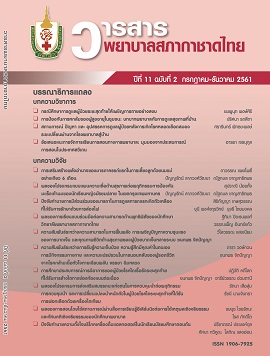Effect of the Cooperative Learning Method on the Cognitive Ability of Students at the Thai Red Cross College of Nursing
Keywords:
cooperative learning, cognitive domain, nursing studentAbstract
Research was conducted using a one group pre-posttest design to 1) examine the effect of the cooperative learning method on cognitive ability, including knowledge, comprehension, application, and analysis of nursing students, and 2) explore students’ opinions relating to participating in the activity of the preparation of community health nursing and medical care before the nursing and midwifery license examination. The subjects comprised 169 fourth year students from the Thai Red Cross College of Nursing. All subjects participated in the activity of the preparation of the community health nursing and basic medical care subject before taking the national nursing and midwifery license examination. Data was collected using test and questionnaire. The findings revealed that the average scores of cognitive ability after participating in the activity were higher than the prior scores. Considering the average cognitive ability scores for each level before and after participating in the activity, it was found that the scores of knowledge, comprehension, application and analysis after participating in the activity were higher than the prior scores. There was a significantly statistical difference (p <.05). This suggested that the cooperative learning method could be applied to other subjects in order to enhance students’ learning ability and increase the intelligence of students.
References
2. พิมพันธ์ เดชะคุปต์. การเรียนการสอนที่เน้นผู้เรียนเป็นสำคัญ: แนวคิด วิธีและเทคนิคการสอน 1. กรุงเทพฯ: เดอะมาสเตอร์กรุ๊ป แมเนจเม้นท์; 2544.
3. Suwittawat C. Effect of cooperative learning on knowledge and ability of nursing students in health assessment using functional health pattern. KKU Research Journal 2014;19(3):485-94. (in Thai)
4. Duangupama S, Nontapa S, Donsopon K. Effectiveness of cooperative learning to the achievement of modern management techniques subject. Journal of Education Naresuan University 2013;15(4):122-8. (in Thai)
5. Boonvas K. The effectiveness of the cooperative knowledge construction model on nursing pedagogy [Internet]. n.d. [cited 2015 Feb 19]. Available from: www.bcnnv.ac.th
6. ชนาธิป พรกุล. การสอนกระบวนการคิด ทฤษฎีและการนำไปใช้. กรุงเทพฯ: สำนักพิมพ์แห่งจุฬาลงกรณ์มหาวิทยาลัย; 2554.
7. Johnson RT, Johnson DW, Smith KA. Cooperative learning [Internet]. 1994 [cited 2016 Nov 19]. Available from: http://www.co-operation.org
8. Chansuvarn S, Noparoojjinda S, Jaiyungyuen U. Factors related to the results of nursing license examination among bachelor graduates from Boromrajonani College of Nursing, Suphanburi. Journal of Nursing and Education 2016;9(2):81-92. (in Thai)
9. Kunaviktikul W, Klunklin A, Chontawan R, Athaseri S. Factors related to the results of nursing and obstetric license tests. Thai Journal of Nursing Council 2012;27(3):11-28. (in Thai)
10. แสงทอง คงมา. การพัฒนาชุดการสอนแบบร่วมมือเรื่อง บทประยุกต์ กลุ่มสาระการเรียนรู้คณิตศาสตร์ชั้นประถมศึกษาปีที่ 6 [อินเทอร์เน็ต]. 2554. [เข้าถึงเมื่อ 7 พ.ย. 2559]. เข้าถึงได้จาก: www.Kroobannok.com.
11. มหาวิทยาลัยสุโขทัยธรรมาธิราช. คู่มือสัมมนาเสริม ชุดวิชา 24703 การพัฒนาเครื่องมือสำหรับการประเมินการศึกษา ครั้งที่ 2 [อินเทอร์เน็ต]. 2544. [เข้าถึงเมื่อ 7 พ.ย. 2559]. เข้าถึงได้จาก: www.stou.ac.th/Thai/Grad_Stdy/.../24703/คู่มือสัมมนาเสริม%20(24703).doc
12. Phokate S, Sranamkam T. Development of web-based cooperative learning model for physics subject to encourage critical thinking skills of the engineering students at Rajamangala University of Technology Isan. KKU Research Journal 2012;12(3):105-16. (in Thai)
13. แสงดาว คุ้มวานิช, ณัฐิกานต์ จิตนารินทร์, พรชัย จันอารีย์. การจัดการเรียนรู้แบบร่วมมือ (Jigsaw) เรื่องการสถาปนาอาณาจักรอยุธยา และการสร้างความมั่นคงให้แก่อาณาจักรของนักศึกษาระดับประกาศนียบัตรวิชาชีพชั้นสูง ปีที่ 1 สาขาเทคโนโลยีคอมพิวเตอร์ วิทยาลัยเทคโนโลยีโปลิเทคนิคลานนาเชียงใหม่ [อินเทอร์เน็ต]. 2555 [เข้าถึงเมื่อ 7 พ.ย. 2559]. เข้าถึงได้จาก: www.lannapoly.ac.th/online/MIS/ResearchDetail_new.php?Research/FileUpload/20121123_103822.pdf.
14. Kongviriyapisal M. An analysis of relationship of causal factors influencing the first-year students’ self-directed learning readiness at Rajabhat Suan Dusit University [Master Thesis in Educational Research and Statistics]. Bangkok: Srinakarinwirot University; 2006. (in Thai)
Downloads
Published
Issue
Section
License
เนื้อหาบทความหรือข้อคิดเห็นต่างๆ ในวารสารพยาบาลสภากาชาดไทยนี้ เป็นความคิดเห็นของผู้เขียนบทความ ไม่ใช่ความเห็นของกองบรรณาธิการ หรือสถาบันการพยาบาลศรีสวรินทิรา สภากาชาดไทย





